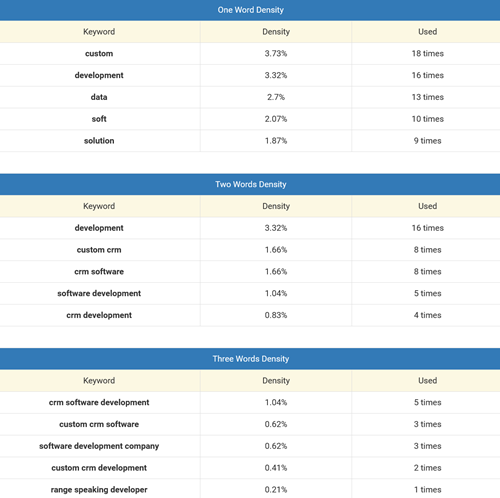- 3 Reasons Why Companies Opt for Custom CRM Software
- 1. You Get Only What You Need – Not More, Not Less
- 2. You Can Rest Assured Your Data Is Safe & Sound
- 3. You’ll Be Able to Tweak It Any Way You Want Later On
- 2 Downsides of Custom CRM Software Development to Consider
- 1. Custom Development Isn’t Cheap – Nor Is It Fast
- 2. A Lot Depends on Your Development Partner
- So, Is Custom CRM Development Worth It?
No business can exist without its customers. And when it comes to retaining their loyalty and attracting new clients, the way you go about customer care can make it or break it, no matter the industry.
This is where CRM software comes in. It’s an irreplaceable tool for managing tons of data, ensuring no client is overlooked, and making data-driven decisions.
But there’s no need to convince you that your business needs a CRM. You probably already use an out-of-the-box solution. Or, you’ve made up your mind on getting one – but haven’t decided on the how.
The question you’re now facing is: Is turning to CRM development services worth it? Will getting a bespoke solution be the right choice for my company?
Here are 3 pros and 2 cons you should weigh in on before making the final decision.
3 Reasons Why Companies Opt for Custom CRM Software
Let’s kick it off with the more pleasant-to-think-about things – namely, 3 key benefits of getting a custom CRM instead of an off-the-shelf one.
1. You Get Only What You Need – Not More, Not Less
Getting exactly what you need in an out-of-the-box CRM is extremely rare. Typically, businesses get themselves into one of these scenarios:
- There are features you won’t ever use. But even if you don’t ever touch them, you’ll still have to pay for them if they’re included in the subscription plan you’ve chosen. That’s plain wasteful.
- You lack certain functionality. Everything’s great – except the reporting tools or stats pages aren’t as detailed as you’d like them to be. And it’s not like you can modify the solution to fit your needs – you don’t own it.
That’s because no two businesses are 100% the same. But ready-to-use CRMs have to sell their product to the widest audience possible.
Developing a CRM from scratch equals avoiding both of those scenarios, provided you know precisely what features your business needs. There’s a reason you see the word “custom” in the phrase “custom CRM development”, after all.
Here are just three examples of what ‘getting exactly what you need’ means:
– Custom CRM software is optimized to fit your already existing internal processes;
– It’s designed to have the best user experience for your staff;
– You can integrate it into your corporate software ecosystem.
2. You Can Rest Assured Your Data Is Safe & Sound
When you use someone else’s product, you have no say in how your data is handled. That goes for how and where it’s stored, whether it’s transferred elsewhere, and how well it’s protected.
It’s not your corporate data you should be concerned about. The information you have about your customers is considered their personal data. If there’s a data breach and it ends up posted online or in the hands of scammers, it’ll be a severe hit on your reputation.
With a custom CRM, you’re in charge of your data security. That means you have 100% control over everything related to data management. That translates into mitigating the risk of data breaches – provided you don’t overlook data security during the development.
3. You’ll Be Able to Tweak It Any Way You Want Later On
When you hire a CRM software development company, you own the final product. That means you can make any sort of modifications for it later down the road – an impossible feat if you use a third-party solution.
Why would you want to tweak it? Don’t worry: your bespoke CRM will serve you well for some time, of course. But sooner or later, your business will evolve and new needs will arise, such as:
– Adding other features, especially when it comes to new technologies;
– Integrating it with new tools you decide to add to your corporate toolbox;
– Scaling it to match the increase in the volume of your customer database.
If you ‘outgrow’ your out-of-the-box CRM in all of its subscription-plan variations, all you can do is switch providers.
It’s often not as easy as exporting a file in one app and importing it to another one. You may have to adapt your exported database to a new format. The bottom line is, that’s a time-consuming process that will stall your team’s work.
2 Downsides of Custom CRM Software Development to Consider
There aren’t that many cons to getting a tailor-made solution – but they aren’t insignificant, either. To be precise, there are just two of them. Let’s take a closer look at what they represent.
1. Custom Development Isn’t Cheap – Nor Is It Fast
This is the main con that scares off most companies. CRM software development will cost you a lot, and you’d have to pay it up all at once.
Although, bear in mind: it’s impossible to get an accurate price range without speaking to a developer representative. They need to know what you want first because the costs can vary wildly. That’s why developers encourage you to contact them before giving a quote instead of posting a price list on their website.
Besides the hefty costs, it’ll take a lot of time – months, in most cases – before your staff will have a chance to start using the CRM. (If any company promises you a solution made fast, run: quality development can’t be rushed.)
But custom development of any kind is an investment. And in the case of CRMs, it’s likely to pay itself off.
For example, you’d have to pay $45,000 a year for using Salesforce’s Enterprise Plan if you have a customer care team of 25 people. So, in the long run, a subscription-based CRM is likely to end up costing you more over several years than getting and maintaining your own system.
2. A Lot Depends on Your Development Partner
While you can test an off-the-shelf CRM before buying it, you can’t do the exact same thing with a custom solution. You’ll have to rely on your chosen CRM software development company’s expertise to get everything right.
That’s not a con in and of itself; it’s rather a risk you’ll have to take. The good news is, it can be mitigated. Here’s a quick overview of the top 6 tips on just that:
- Know exactly what you need and put it into writing (i.e. make a brief);
- Check out the company’s portfolio to see if they’ve already worked with similar demands and clients;
- Check the reviews on Clutch and GoodFirms;
- Ask for a rough estimate of development costs at several companies before making a decision;
- Bring someone with tech expertise on board for the tech research part;
- Have a meeting face to face or over a video conference to assess the company’s hard and soft skills.
So, Is Custom CRM Development Worth It?
Of course, no one can answer this question except you. That’s because you have to weigh in on whether the pros of turning to a CRM software development company outweigh the cons in your particular case.
However, if you’d like to know what a generalized version of a typical CRM development client is like, it’s usually:
– A mid-sized or large enterprise;
– Tried off-the-shelf solution(s) but that experience was unsatisfactory;
– Paying or would pay for an out-of-the-box CRM more in the long run than for a custom solution;
– Considering a CRM a need, not a want;
– Ready to invest time and money into the development.
- 3 Reasons Why Companies Opt for Custom CRM Software
- 1. You Get Only What You Need – Not More, Not Less
- 2. You Can Rest Assured Your Data Is Safe & Sound
- 3. You’ll Be Able to Tweak It Any Way You Want Later On
- 2 Downsides of Custom CRM Software Development to Consider
- 1. Custom Development Isn’t Cheap – Nor Is It Fast
- 2. A Lot Depends on Your Development Partner
- So, Is Custom CRM Development Worth It?





